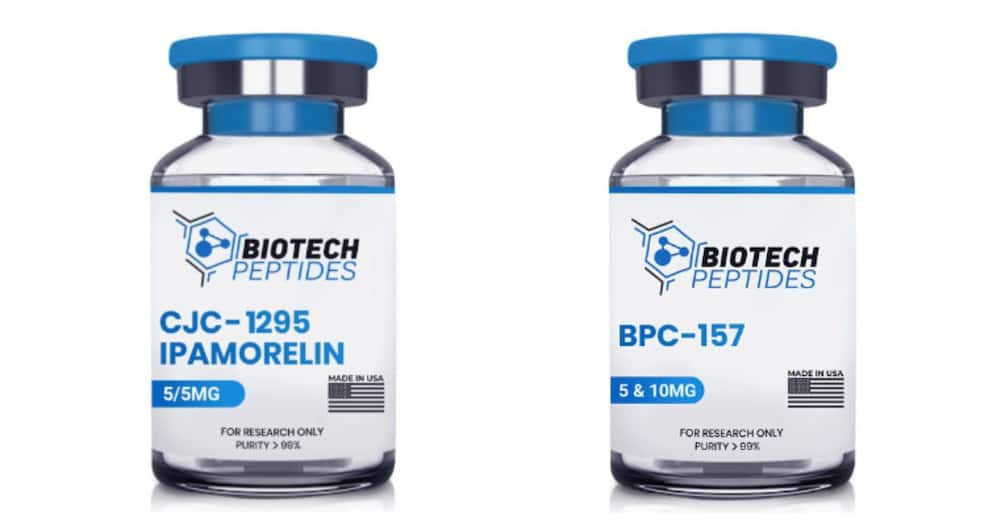Biotech Peptides Leading in the Field of Research and Lab Use Peptides
Thymosin Alpha-1: Peptide History
A physiologically active peptide called Thymosin Alpha-1 is produced from prothymosin-alpha. According to current theories, Thymosin Fraction-5 mostly consists of Thymosin Alpha-1. This active component is thought to be responsible for restoring immunological function in animals that are either athymic or have defective thymus glands. Among the first peptide isolates from Thymosin Fraction-5 to be sequenced and subsequently synthesized was Thymosin Alpha-1.
The PTMA gene codes for the 113-amino acid polypeptide prothymosin-alpha. Research has suggested that the 28-amino acid fragment derivative of prothymosin-alpha, Thymosin Alpha-1, may improve the immune system's cell-mediated immunological component. Research suggests that because of its immunological potential, it may be applicable in the context of hepatitis B and C viruses. Investigations purport that since Thymosin Alpha-1 may upregulate cytotoxic T-cells engaged in immune surveillance, it may also be utilized in the context of neoplasias.
Proteins known as thymosins have a wide range of biological functions. Many animal tissues contain them. Thymosins get their name because they were first isolated from thymic tissues. Modulation and regulation of biological reactions are the primary roles of thymosins. It has been suggested that they may also increase bone marrow leucopoiesis. Endogenous thymosins have been hypothesized to increase a research model's immunocompetence status because they may facilitate leucopoiesis, producing white blood cells from their stem cell progenitors. Research on isolated thymic extracts has proposed the possibility of synthetically producing and using two thymosins, Thymosin alpha-1 and Thymosin beta-4, for immunostimulation and immunomodulation.

Read also
Ultra Mel Custard Scone recipe showing step-by-step banking process gets 1 million TikTok views
Researchers in the 1960s tried to classify and investigate the physiologically active humoral substances secreted by the thymus when they found thymosins. Researchers speculated that although certain thymus gland isolates restored immunological functioning, others did not. Thymosin Fraction-5 was the combined name for these isolates. A thorough examination of Thymosin Fraction-5 revealed that it consisted of around 40 peptides, collectively known as thymosins. Electric field investigations determined these thymosins' alpha, beta, and gamma percentages. The thymosin fractions were shown to be structurally and genetically unrelated in subsequent molecular investigations. Thymosin beta-1 is ubiquitin, as suggested by recent research on thymosins.
Research has also purported that cells outside the thymus may produce thymosins. In addition, studies hinted that athymic mice (mice without a thymus) seemed aided by Thymosin alpha-1 presentation regarding T-cell development. It has been ascertained that Thymosin alpha-1 might interact with a malfunctioning thymus to restore and normalize the immunological state in immunodeficient research models via its immune-potentiating effects.

Source: UGC
Thymosin Alpha-1 and Immunity
This research aimed to examine if Thymosin alpha-1 may enhance T-cell rosettes. Two research model groups were included in this research. A viral infection affected one group, and primary immunodeficiency affected the other. These research models' lymphocytes were cultured in vitro using thymus extracts from calves and erythrocytes from sheep. The data suggested that Thymosin had no additional impact on the T-cell populations after they had attained their usual population.
As suggested by this research, research models with thymic hypoplasia may have increased the number of T-cell rosettes when presented with Thymosin alpha-1. It also indicated that Thymosin-α1 may have the potential to restore the immune system's cellular arm partly.
Thymosin Alpha-1 and Chronic Hepatitis C
"Combination Thymosin Alpha 1 and lymphoblastoid interferon treatment in chronic hepatitis C" was the title of the 1995 British Medical Journal article by Rasi et al. Examining the potential impact of combination adjuvant on chronic hepatitis C was the primary objective of this research.

Read also
Mzansi teacher builds dream home for family, TikTok video debunks myths about educator's salaries
The research included 15 research models of chronic hepatitis C who tested positive for HCV RNA in their blood. Four of the cohort did not appear to respond to regular interferon monotherapy, while the others were new to experiments. All research models underwent 12 months of presentation with the combo and 6 months of follow-up.
After 6 months of combined presentation, 7 research models tested negative for HCV RNA; after the presentation, that number seemed to have risen to 11, including 2 subjects who did not appear to respond to regular interferon monotherapy. Six of eleven research models seemed to maintain a negative HCV RNA status throughout the follow-up.
Third, Thymosin alpha-1 has been hypothesized to partly restore the immune system's cellular arm by boosting the amount of T-cell rosettes in research models with thymic hypoplasia, as suggested by the three studies above. Additionally, this study has suggested significant promise in the context of Chronic Hepatitis C. It has been purported that Thymosin alpha-1 may affect immune function by upregulating the production of IL-2 and IL-2R.
If you are a researcher who wants to buy peptides, you may visit the Biotech Peptides website, the highest-quality vendor of research peptides available online.
References
[i] Ancell CD, Phipps J, Young L. Thymosin alpha-1. Am J Health Syst Pharm. 2001 May 15;58(10):879-85; quiz 886-8. doi: 10.1093/ajhp/58.10.886. PMID: 11381492.
[ii] King R, Tuthill C. Immune Modulation with Thymosin Alpha 1 Treatment. Vitam Horm. 2016;102:151-78. doi: 10.1016/bs.vh.2016.04.003. Epub 2016 May 24. PMID: 27450734.
[iii] Tuthill C, Rios I, McBeath R. Thymosin alpha 1: past clinical experience and future promise. Ann N Y Acad Sci. 2010 Apr;1194:130-5. doi: 10.1111/j.1749-6632.2010.05482.x. PMID: 20536460.
[iv] Goldstein AL. Clinical applications of thymosin alpha-1. Cancer Invest. 1994;12(5):545-7. doi: 10.3109/07357909409021415. PMID: 7922712.
[v] Camerini R, Garaci E. Historical review of thymosin α 1 in infectious diseases. Expert Opin Biol Ther. 2015;15 Suppl 1:S117-27. doi: 10.1517/14712598.2015.1033393. Epub 2015 Jun 22. PMID: 26098768.
Source: Briefly News


